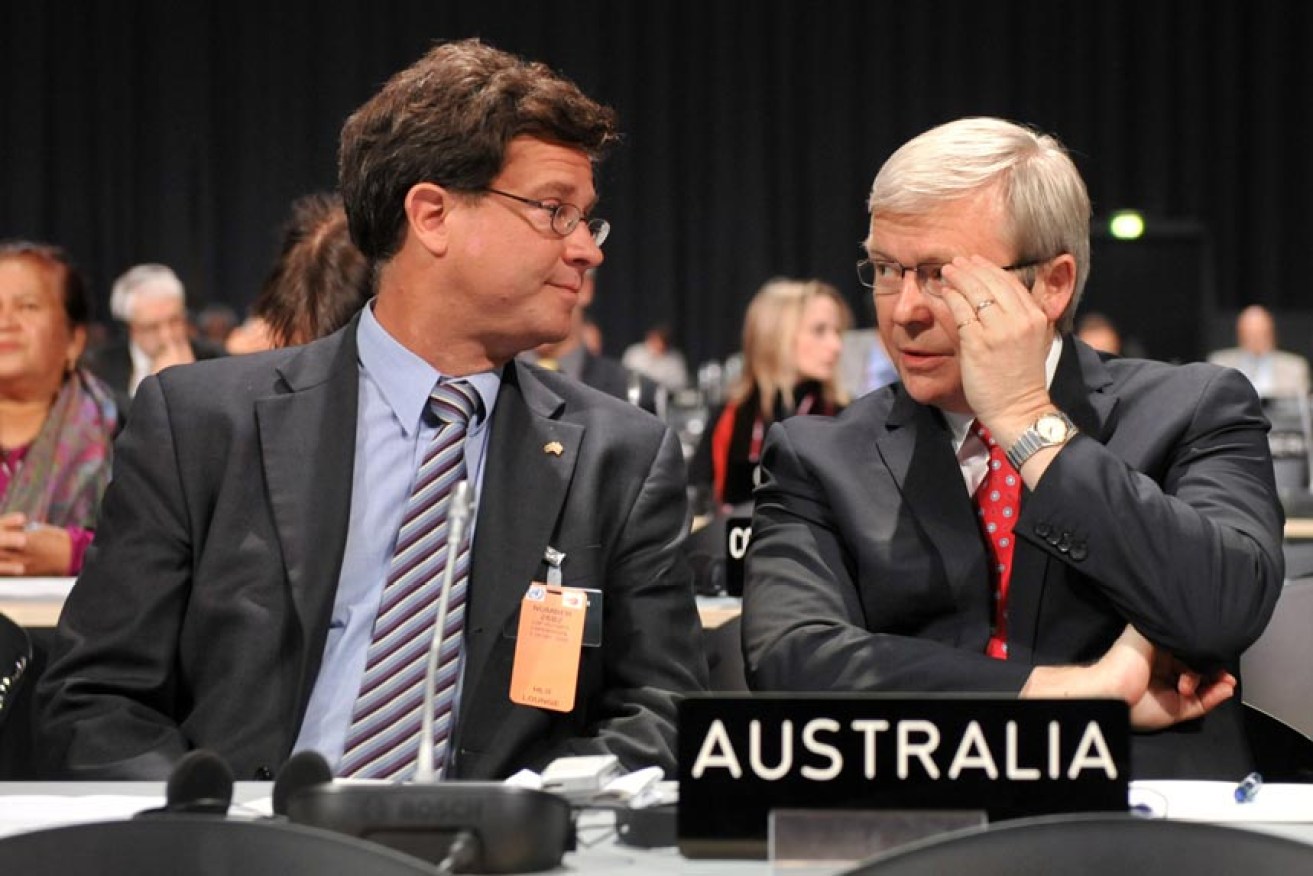EXCLUSIVE: The moment Kevin Rudd lost his way


Getty
Kevin Rudd liked to chat. During my brief time as his travelling press secretary, trailing him to all corners of the globe and along the coasts of Australia, he talked me through his passion for classical music and for theatre, his reverence for the Romantic Age of Science, his deep love of the Mandarin language.
One day he explained to me that one of the reasons he found history and politics so fascinating was the intersection of the nineteenth century “great man of history” thesis with the overwhelming forces that the world sometimes unleashes.
History could absolutely be influenced by the actions of brave, visionary men and women, he believed. At the same time, he had no doubt there were waves of change it was difficult for any individual to resist entirely. It was when those waves crashed into those individuals that history became interesting.
In hindsight, Kevin Rudd’s leadership of the nation was a perfect illustration of the principles he found so compelling. He was a man of vision who could both create momentum and opportunities and seize them when they came to him. And he was a man who would eventually be crushed by a perfect storm of his own flaws and forces beyond his control.
He was a man of vision who could both create momentum and opportunities and seize them when they came to him. And he was a man who would eventually be crushed by a perfect storm of his own flaws and forces beyond his control.
Election results have a bad habit of looking inevitable in hindsight, a point Chris Bowen made on Wednesday night. In truth, no election win is inevitable. Some have argued that Rudd won the election Labor was always going to win in 2007. I don’t believe that. Of course, John Howard had been in power for twelve long years. That was a necessary condition for change, but it was not sufficient. It was Rudd who fostered the mood for change, who grasped it and made it solid, who used it as a deadly weapon against a conservative Prime Minister who until then had resisted everything that had come his way.
It is impossible to forget the spirit of hope that spread across much of the nation that year. That is an achievement too often overlooked: it is rare that an individual can instil that sense of excitement in a country of such practised laconicism. And with that talent — the first sign that he could turn history to his own ends — Rudd became only the third Labor leader since the Second World War to take Labor from opposition into government.
At first, his luck held: his many abilities met the waves of history at the right times, as they had during the election. Many of the things said about Rudd as criticisms were exactly right: he was given to grandiose, symbolic gestures; he had an unshakeable belief in his own rightness; he was a micro-manager. As he approached the apology to the Stolen Generations, all of these worked for him rather than against him. With an intensely personal speech he had poured himself into, he again captured the mood of the nation, and created out of the cross-currents of history a moment of healing, not just for the Indigenous population but for people across the land.
Towards the end of his first year in office another wave of history came crashing towards Rudd. He did not blink. Again, it was the traits that would later be his downfall that steered him through. His colleagues would later complain of centralised decision-making; of relying on a small cadre of Ministers and staff for advice, including the “kitchen cabinet”; of never accepting a screwdriver where a pneumatic drill would do. Each of these was fair. But it is for precisely these reasons that it is impossible to imagine anyone else taking the action Rudd took during the Global Financial Crisis, action that would later be vindicated by economists across the world. It is one of the great human victories but political losses of Labor’s time in power that the thousands upon thousands of Australians whose jobs were saved never realized their jobs were in danger, and thus never knew to thank Rudd for their livelihoods.
Then came the turning point. I was with Rudd in Copenhagen. Anyone who thought that he was all show would have been shamed by that experience. The man barely slept, devoting all his energy to reaching a global agreement on climate change. But none of that mattered, because Copenhagen was a failure. This is when history and Rudd faced each other and realised they no longer liked what they saw. Rudd, the “great man of history”, wanted to deliver on “the greatest moral challenge” of our time. History was no longer interested.
Copenhagen was when history and Rudd faced each other and realised they no longer liked what they saw.
Very soon, all the things that had made Rudd seem superhuman became millstones around his neck. His sweeping vision suddenly became a symbol of his inability to get things done. His preternatural reading of the popular will became seen as a slavishness to polling. His micro-management and centralisation of power, so effective in a time of crisis, were written about as marks of a man who couldn’t delegate or consult.
These shifts in perception and Rudd’s downfall were partly the results of historical factors. The potential for a global consensus on climate change fractured. Corporate Australia discovered its talent for ferocity. The media cycle became faster and more ruthless. The ethos of state politics arrived in Canberra. But they were partly the result of decisions Rudd himself made when confronted with those forces: from postponing the emissions trading scheme to the way in which he dealt with the mining tax. Together, these events and decisions directed the public towards the negative side of Rudd’s attributes rather than the positive. His colleagues, already aware of Rudd’s flaws, were fortified in their belief those weaknesses had to be dealt with.
The fact is that all of the character traits listed above are accurate, both the good and the bad. That is because they are simply different shadings of the same characteristics. It is a truth well known to the scripters of mythology: our greatest strengths are often our greatest weaknesses. How much you place your emphasis on the good or the bad depends on your own vantage point. In Australian politics this is often determined simply by whether you are a Liberal voter or a Labor voter. Rudd is more polarizing than that. It has been fascinating to watch the reactions of my Labor friends since Rudd’s announcement of his departure. They are split evenly between paying tribute to the man and his achievements and declaring “Good Ruddance!”
Which brings me to the last of Rudd’s defining traits. Without burning ambition, he would never have come so far from such humble beginnings. He would never have become Labor leader, nor had the chutzpah to take on Australia’s second longest serving Prime Minister. But he did, and for those things he will be remembered always.
But with a little less of that ambition, too, he would have accepted the election of Julia Gillard as party leader in 2010. He would have gone to his political grave a popular martyr. And the history of his time in politics would be different. To suggest what he should have done in the aftermath of the 2010 spill is a task for others. But it is unarguable that history would view him more kindly had he left things there. Instead, he mounted a long war of attrition against the woman who replaced him. He mounted no less than three leadership challenges (one aborted) during Gillard’s tenure. The result of that for his legacy is the eternal enmity of many Labor supporters, many of whom saw his actions as needlessly destructive.
With a little less ambition he would have accepted the election of Julia Gillard as party leader in 2010 and gone to his political grave a popular martyr.
The truth of Kevin’s time in politics is that we will never know what sort of a Prime Minister he would have been had he stayed longer in the job. Few Prime Ministers find their feet early; most suffer a crisis of confidence in their first term. And we will never know either what sort of a Prime Minister Julia Gillard would have been had she been unencumbered, both by Rudd’s removal and his continuing presence. These are the historical questions to which we will never have answers. They are the great tragedies of what I believe was a great two-term Labor Government. But, as I have written before, they should not stop us valuing the immense contributions of both these leaders to our nation.
After Rudd was removed, I went to work for Julia Gillard, a great leader in her own right. Over the years to come I would learn anew the lesson I had absorbed from my stint with Rudd: that each leader’s strengths are their weaknesses, that it is the intersection of those traits with their times that shapes their legacy. This much is eternally predictable. It is how those patterns play out that ensures politics remains the fascinating spectacle that it is.
Kevin wasn’t the only MP giving a speech in the House on Wednesday night. Several newly elected members delivered their maiden speeches, nervously dipping their toes into the water of what it is to be an elected representative for the first time. As one generation left the building, a new generation took its place. Whether history will carry them high, whether they have the nous and courage and luck to overcome it when the inevitable crash comes, will determine what mark they have left by the time it is their turn to speak one last time in the House.
Sean Kelly was an adviser to Kevin Rudd from 2009 then to Julia Gillard from 2010. He is on twitter @mrseankelly








